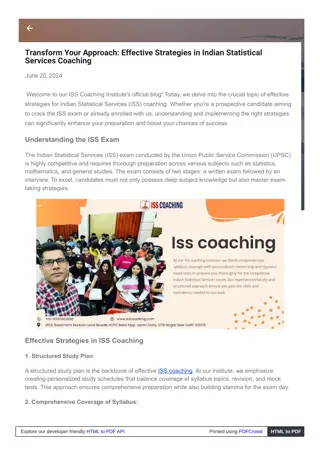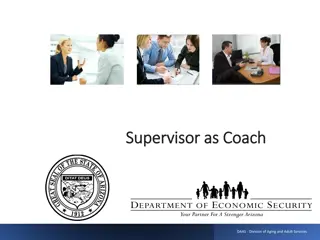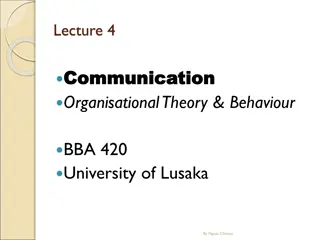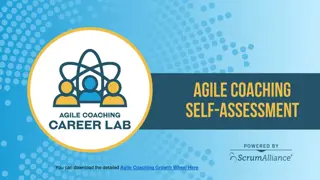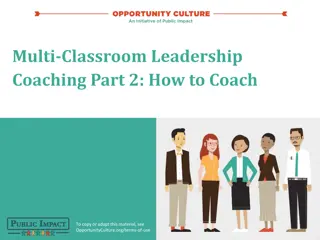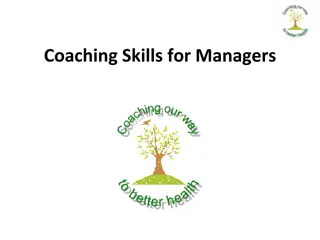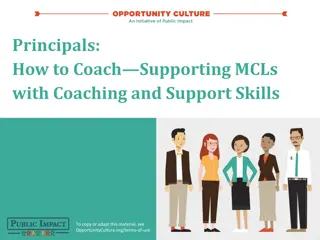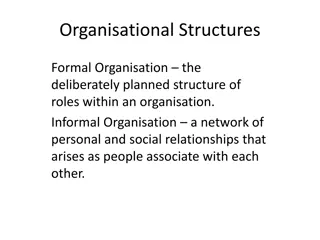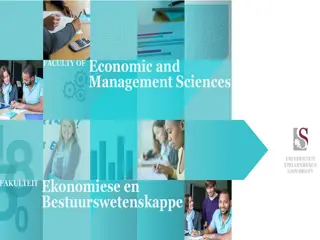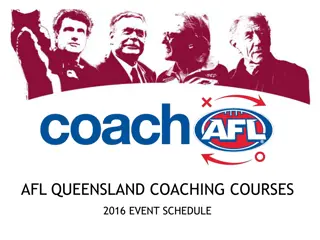Understanding the Vision and Benefits of Organisational Coaching
Explore the concept of organisational coaching, its advantages for individuals and organizations, the roles of mentors and coaches, and when to use mentoring versus coaching. Discover the benefits of coaching for organizations, including empowerment, employee engagement, performance improvement, talent development, and motivation. Uncover how coaching can enhance skills and demonstrate an organization's commitment to staff development.
Download Presentation

Please find below an Image/Link to download the presentation.
The content on the website is provided AS IS for your information and personal use only. It may not be sold, licensed, or shared on other websites without obtaining consent from the author. Download presentation by click this link. If you encounter any issues during the download, it is possible that the publisher has removed the file from their server.
E N D
Presentation Transcript
Organisational Coaching The Vision and Benefits Paul Blacklock Organisational Development Practitioner Gateshead Health NHS Foundation Trust
Outline Introduction to coaching Advantages of coaching for the individual and organisation Aspirations for coaching at GHNT.
Coaching and Mentoring What is a mentor? The mentor is someone usually more senior or experienced who is appointed or chosen to help and advise another employee (Downey, M 2002: Effective Coaching)
Coaching and Mentoring What is a coach? Coaching is the unlocking a persons / groups potential to maximize their own performance. It is helping them to learn rather than teaching them. (Gallway, T in Whitmore, J 2009: Coaching For Performance)
Coaching and Mentoring Clutterbuck and Megginson (2010) attempt to define the difference by stating that coaching affects performance change and that mentoring influences career self-management. Focus Role Processes Environment Coach Specific areas or issues at work Short- term Does not need to be SME Tends to be structured, regular meetings Mentor Career and personal development Long- term, holistic Usually more experienced. Passes on knowledge and development Infrequent, informal meetings. Mentee sets agenda, seeks advice/guidance/ support
Coaching and Mentoring When should you use mentoring A new member of the workforce arrives Change in role Any time the management or individual feel the requirement When should you use coaching Continually used in order to enhance the individual, team and organisation
Coaching Benefits for the organisation Empowers individuals and encourages them to take responsibility Increases employee and staff engagement which can lead to higher retention Improves individual performance and supports employees with new responsibilities Helps identify and develop high potential employees Helps identify both organisational and individual strengths and development opportunities Helps to motivate and empower individuals to excel Demonstrate to employees that an organisation is committed to developing its staff and helping them improve their skills
Coaching Benefits for the individual Have a positive impact on performance Learn to solve own problems Improve managerial skills Learn how to identify and act on development needs Greater confidence Greater self-awareness Identify and resolve issues that might otherwise affect performance Acquire new skills and abilities Develop greater adaptability to change
Coaching in Practice If we did all the things we were capable of doing, we would literally astound ourselves. Thomas Edison
Performance Equation Performance = Potential - Interference He must think of his people in terms of their potential, not their performance. (Whitmore 2009)
Interference (Psychology) Confidence Attitude Motivation Stress Fear
Performance equation in action Actual potential Potential Fear Motivation Confidence
What is the role of the coach? Observation and listening techniques Effective questioning Constructive feedback Goal setting
Performance Cycle psychology potential Self image Results Beliefs performance psychology Goals potential Expectations Actions Attitude psychology potential
Feedback Give/receive constructive feedback balances negative points with positive ones to build a positive self-image. Allowing two way feedback builds trust which supports a stronger belief in the coach/coachee relationship
Performance Cycle psychology Potential Self image Results Beliefs performance psychology Goals potential Expectations Actions Attitude psychology potential
Goals Set Goals use the GROW model and SMART targets. This ensures the individual s Expectations are realistic and that improvements in performance can be clearly measured through results
GROW 1. Goal 2. Reality 3. Options 4. Will What is the focus? What happened or occurred? What can be done differently? What impact will the change have and is that a desired outcome?
SMART Targets Specific Measurable Achievable Realistic Timebound
Performance Cycle psychology potential Self image Results Beliefs performance psychology Goals potential Expectations Actions Attitude psychology potential
Effective Questions Employ effective questions to raise awareness. To give ownership of Actions back to the individual and promote a positive Attitude to future goals. Eg: What do you think you have to do to improve your performance? What will you have to do to progress to the next level?
Performance Cycle psychology potential Self image Results Beliefs performance psychology Goals potential Expectations Actions Attitude psychology potential
Observation and Listening Techniques Effective observation and listening to coachees Actions and Results allows the coach to build a picture of the individual s current performance.
Performance Cycle psychology potential Self image Results Beliefs performance psychology Goals potential Expectations Actions Attitude psychology potential
Developing a Coaching Culture at Gateshead Health Organisations go through 4 phases of coaching (Peterson 2010) - Stage 1. Ad hoc coaching - driven by individuals - Stage 2. Managed coaching driven by a champion or sponsor - Stage 3. Proactive coaching driven by business need - Stage 4. Strategic coaching driven by organisational talent strategy
Developing a Coaching Culture at Gateshead Health 1. Engaging current coaches 2. Engaging wider organisation 3. Evaluating benefits and revising offer
Feedback from Coaches Short-term aspiration Comms spread the word about coaching. Change the perception of coaching Identify an active senior sponsor for the coaching programme to promote it Continue to develop wider coaching network Establish supervision for existing coaches Create coaching case studies Establish baseline measure to assess current coaching offer in the Trust Review contracting arrangements for coaching conversations Buddy up new coaches and give instant access to coaching drive, move resources to Pandora for easier access Plan/deliver CPD program for coaches Medium/long term aspiration Coaching Pipeline. Spring clean and develop coaching resources. Explore coaching website Build on and expand pool of coaches. Establish Return on Investment measure Explore tech options for coaching. Virtual offer for staff. Develop flexibility of coaching offer so its available outside office hours Explore external coaching opportunities for Trust coaches Explore protected time for coaching Consider quarterly coaching newsletter
Developing a Coaching Culture at Gateshead Health Organisations go through 4 phases of coaching (Peterson 2010) - Stage 1. Ad hoc coaching - driven by individuals - Stage 2. Managed coaching driven by a champion or sponsor - Stage 3. Proactive coaching driven by business need - Stage 4. Strategic coaching driven by organisational talent strategy
Why? Organisations need to be flexible and adaptable to survive. Coaching can support by: Creating the habit of challenging processes, behaviours and assumptions Making succession more robust and better able to encompass changes in the internal and external environment Reduce the turnover of talent Improve employee engagement and job commitment and performance
Outline Introduction to coaching Advantages of coaching for the individual and organisation Aspirations for coaching at GHNT.



